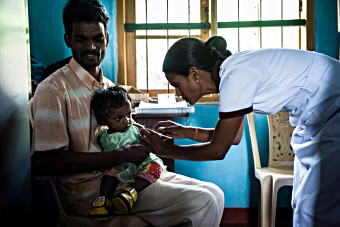Vaccine Innovation and the Global Press: Seth Berkley at the UN Foundation

At a hospital in Kilinochchi, northern Sri Lanka, a nurse vaccinates a child with the pentavalent vaccine. To date, 72 GAVI-supported countries have introduced the five-in-one vaccine – part of a global scale-up in immunisation. Copyright: GAVI Alliance/2013/Sanjit Das
New York, 23 September 2013 – Over 20 of the world’s most engaged journalists from across the world gathered this morning for the second day of the UN Foundation Global Press Issues Fellowship to be briefed on innovation and the future of vaccines in global health.
The reporters representing media outlets from around the world were attending the event to help their readers better understand the issues of UN General Assembly week.
Dr Seth Berkley, CEO of the GAVI Alliance, attended the event and spoke about his vision for the future of vaccines and how GAVI’s achievements and ambitions fit into this landscape of innovation.
Progress reviewed
At a time when the eyes of the global community are fixed on 2015 and the targets that will replace the Millennium Development Goals, Dr Berkley argued strongly for the role of vaccines in the future of global health, emphasising their cost-effectiveness and economic viability as a health intervention.
GAVI envisages a future in which every child has access to all 11 lifesaving vaccines recommended by the World Health Organization, regardless of their gender, the wealth of their parents or where they were born.
“Today, vaccine coverage against these 11 antigens in the world’s 73 poorest countries is only about 5%. Measuring success towards having fully immunised children around the world may be a good indicator to use for the next Millennium Development Goals,” Dr Berkley said.
Acceleration of vaccine uptake
Dr Berkley also pointed to the acceleration of vaccine uptake that has been achieved by GAVI and its partners, providing children in developing countries with access to lifesaving vaccines 10-15 years quicker than was possible a decade ago.
Market shaping, another GAVI priority, has also pushed down the price of five-in-one pentavalent vaccines by 31%, and has recently secured a record low price for the human papillomavirus (HPV) vaccines to facilitate its forthcoming rollout in 10 developing countries.
The Alliance has also pushed its boundaries in reaching children in difficult circumstances. From 2012-13, vaccines will have been launched in fragile states including Somalia, Yemen, DPRK , Sudan and Afghanistan.
Maintaining Momentum
Dr Berkley’s core message today was to build upon the achievements of global health for further progress. With a target of having 245 million children immunised between 2011-15, scaling up is essential. As is the need to maintain commitments to existing vaccine programmes, for example, by completing the introduction of pentavalent vaccine to all 73 GAVI countries or continuing to implement vaccination programs against pneumonia or rotavirus infection.
By 2020 GAVI also aims to have immunised 30 million women and girls against the virus responsible for many cervical cancer cases as part of a huge scale-up of the recently piloted HPV vaccine programme.
Polio eradication
As part of the worldwide polio eradication initiative, GAVI is also getting ready to play a role through the inclusion of inactivated polio vaccine in routine immunisation programmes worldwide. It is also monitoring progresses towards an effective malaria vaccine.
As for technology, GAVI looks to the future of vaccine delivery and storage methods, with hopes of using innovative discoveries and developments to reduce wastage rates and ensure vaccines are safe and effective. Keeping vaccines at a low and stable temperature in developing countries is one example of the kind of challenges that technology could help solve.
“We want to think about different ways to solve cold chain issues. And we are working with countries to make sure they have access to the technology needed. The goal is to reach the 5th child, the child that lives in hard to reach places”, Dr Berkley explained.
Dr Seth Berkley was CEO of Gavi, the Vaccine Alliance from 2011–2023.
